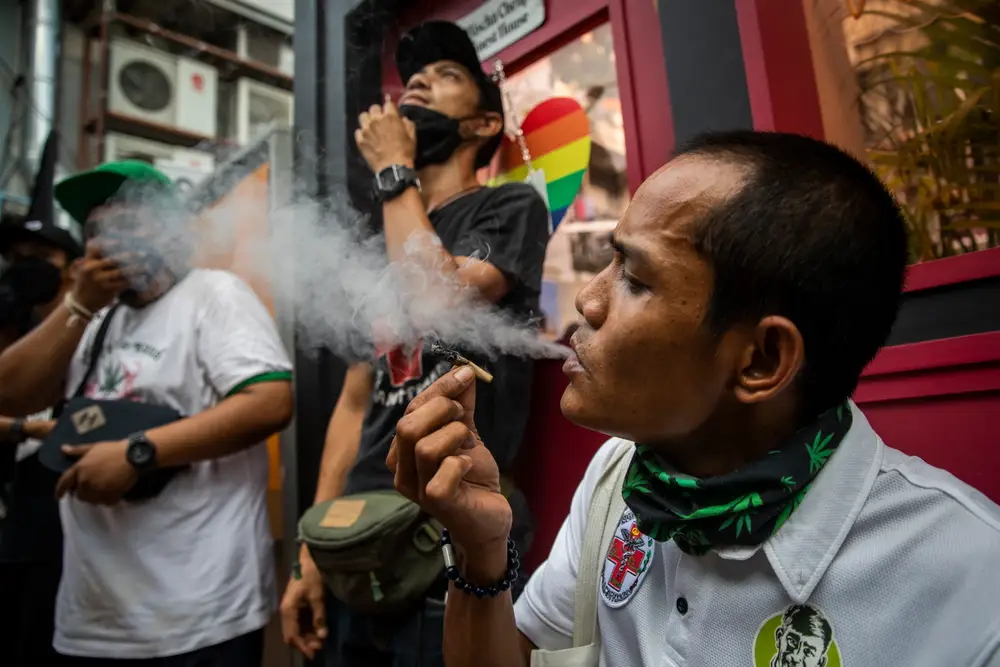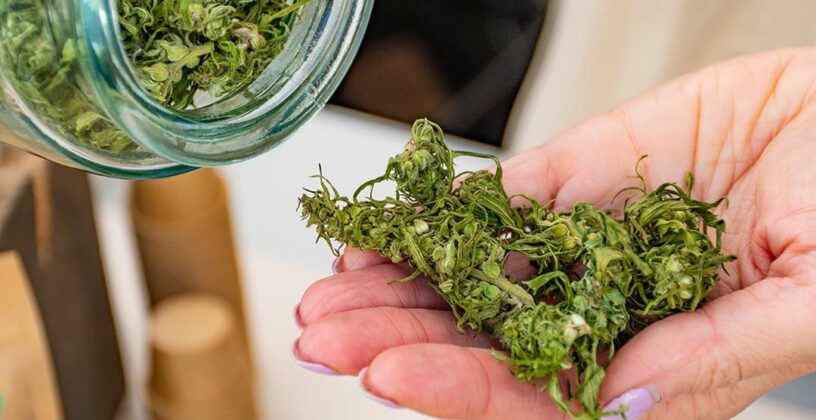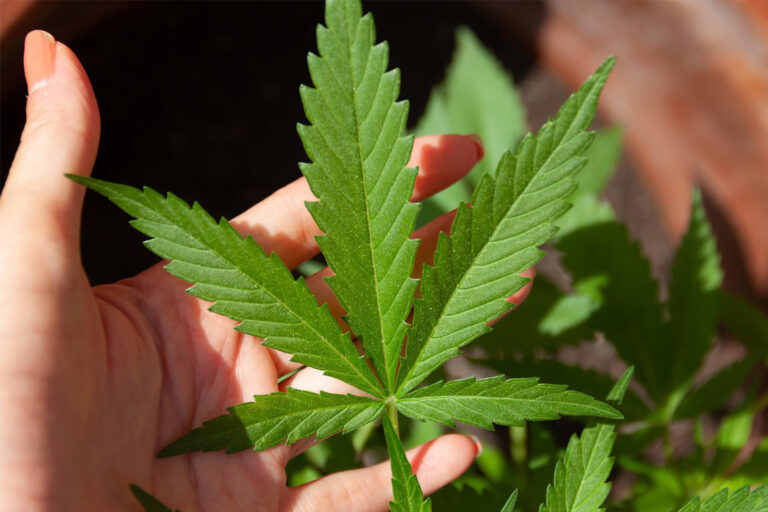(CTN News) – This is an opinion editorial by Carl K Linn, VP of Policy & Business Development at The American Journal of Cannabinoid Medicine.
I extend my best wishes in the name of Prime Minister Srettha Thavisin, Deputy Prime Minister Anutin Charnvirakul, Minister of Public Health Somsak Thepsuthin, Former Minister of Public Health Cholnan Srikaew, and members of the Thai Parliament.
As a representative of The American Journal of Endocannabinoid Medicine, I am writing to you today with renewed optimism regarding Thailand’s potential to become a global leader in responsible cannabis regulation.
In light of the recent cabinet reshuffle and Mr. Somsak Thepsuthin’s appointment as Public Health Minister, there is a critical opportunity to embrace a pragmatic approach that prioritizes public health, economic benefits, and patient well-being.
Cholnan Srikaew’s replacement by former Justice Minister Somsak Thepsuthin highlights the importance of finding a solution to the deep political and social divisions involving cannabis.
A Stalemated Debate and the Need for Compromise
As a result of the ongoing stalemate over the cannabis draft act, particularly the proposed prohibition of recreational use, it is clear that there is no consensus on how to move forward.
As a result of the Prime Minister’s public statements advocating for cannabis to be reclassified as a narcotic and the swift opposition from Deputy Prime Minister Anutin Charnvirakul, there are deep political fissures on this issue.
With its emphasis on negligible regulation or recriminalization, this all-or-nothing approach risks overlooking the potential benefits of a more nuanced regulatory approach.
There is no doubt that Dr. Cholnan Srikaew was under tremendous pressure from both pro-cannabis and anti-cannabis factions during his time as Minister of Public Health.
The influence of former Prime Minister Thaksin Shinawatra, an ardent opponent of cannabis, adds to the complexity of the situation.
A New Health Minister and the Road Ahead
As Health Minister, Mr. Somsak Thepsuthin must navigate a minefield of competing interests. While his prior support for decriminalization is encouraging, he does not possess a strong understanding of the medical aspects of cannabis.
The Limitations of the Binary: Beyond “Anything Goes” or Recriminalization
An all-or-nothing approach to cannabis regulation, such as the one in the Cannabis Act, is exemplified by the current debate surrounding the recreational use of cannabis.
Cannabis recriminalization disregards not only the growing body of evidence regarding its therapeutic potential but also fails to address the thriving unregulated market, potentially further obliterating it.
The Power of “Both/And”: A Two-Tiered Expansive Medical Cannabis Solution
The Expansive Medical Cannabis proposal I recently outlined allows Thailand to take a more nuanced approach: a “both/and” approach. In this framework, medical cannabis regulations are prioritized while acknowledging the realities of existing demand for the product. The proposal is summarized as follows:
-
A Two-Tiered Access System:
-
Tier 1: Expanding Access through Licensed Dispensaries:
-
In this tier, existing dispensaries can be repurposed as medical cannabis dispensaries under a clear regulatory framework to streamline the transition. In addition to offering patients a wide range of cannabis products based on their needs, trained staff can guide them toward appropriate cannabis products as usual.
-
Opponents may argue that an open system poses a risk of misuse. Nevertheless, strict regulations, including age verification, clear dosage guidelines, and aggressive educational environments, can mitigate the risks. It is also imperative to promote responsible use through public education campaigns.
-
A key benefit of this tier is that patients are empowered to explore the benefits of cannabis for their specific conditions by gaining greater control over their treatment journey. Medicinal cannabis dispensaries may be required to present themselves as clinics, offering individualized learning centers with infographics on the walls, peer-reviewed cannabis information online, and even filling prescriptions.
-
-
Tier 2: Prescription-Based Access for Complex Conditions:
-
As part of this tier, patients with complex medical conditions may require ongoing physician supervision, as well as potentially high-THC formulations or specialized cannabis products.
-
This ensures continued doctor involvement for such cases and signals to employees that this patient should not be exposed to other products or enticed to purchase anything not recommended by his or her healthcare professional.
-
The Thai Advantage: Leveraging Traditional Wisdom and Modern Science
There has been a recent explosion in research into the endocannabinoid system (ECS), which provides scientific evidence for the therapeutic effects observed in Thai Traditional Medicine (TTM) practices that have used cannabis for centuries.
In the future, medical cannabis treatments will seamlessly integrate with established TTM practices, providing patients with a truly holistic approach to their medical care. This would strengthen Thailand’s position as a global leader in medical tourism while also fostering innovation within the medical cannabis industry, resulting in the development of innovative treatment options combining traditional practices and modern scientific understanding.
A Call for Open Dialogue and Evidence-Based Policymaking
As Thailand prepares to become a global cannabis innovation hub, the next few months will be crucial for Thailand’s cannabis policy. For Thailand to thrive as a global cannabis innovation hub, I urge you to adhere to the following principles:
-
Open Dialogue: To reach a solution that addresses all concerns, policymakers, medical professionals, industry stakeholders, and the general public must communicate openly and transparently.
-
Evidence-Based Policymaking: Ensure that regulatory decisions are based on the most recent research regarding cannabis’s therapeutic potential and potential risks.
-
A Patient-Centered Approach: We prioritize patients’ needs and well-being. Our two-tiered Expansive Medical Cannabis system provides patients with more control over their treatment journey while ensuring patient oversight.
A brighter future for Thailand cannabis
Thailand can unlock the full potential of cannabis by adopting the Expansive Medical Cannabis proposal:
-
Becoming a Global Leader in Responsible Cannabis Regulation: Thailand can serve as a model for other countries considering cannabis legalization, demonstrating a commitment to safety, accessibility, and responsible innovation.
-
Cultivating a Flourishing Medical Cannabis Sector: Repurposed recreational dispensaries can become hubs for high-quality medical cannabis, fostering competition and innovation within the medical cannabis industry. As a result, Thai will be able to provide patients with a greater variety of safe and effective cannabis products, leading to increased economic growth and job opportunities.
-
A Beacon of Innovation in Medical Cannabis Treatment: Thailand can become a leader in the development of cannabis-based treatment options by integrating traditional practices with modern scientific understanding. This will benefit Thai patients and international medical tourists, further boosting Thailand’s economy.
-
Emerging as a Global Medical Tourism Destination: Combined with Thailand’s established tradition of Traditional Medicine and its reputation for hospitality, a robust medical cannabis program can generate a thriving medical tourism market. Due to Thailand’s cutting-edge cannabis treatments and holistic approach to healthcare, patients from around the world will be attracted to the country.
It is a pragmatic, preventive, patient-centered proposal emphasizing public health, economic growth, and responsible innovation as priorities for the Expansive Medical Cannabis proposal.
By leveraging existing infrastructure, it empowers patients to take greater control of their treatment journeys and fosters a robust medical cannabis industry.
By embracing this framework, Thailand will be able to seize this historic opportunity to become a global leader in the responsible and innovative use of cannabis.
You, the esteemed leaders of Thailand, should encourage open dialogue, prioritize evidence-based policymaking, and put patients’ needs at the forefront of this critical conversation. As a result of our collaboration, Thailand’s citizens and its position on the global stage can benefit from cannabis’s vast potential.








